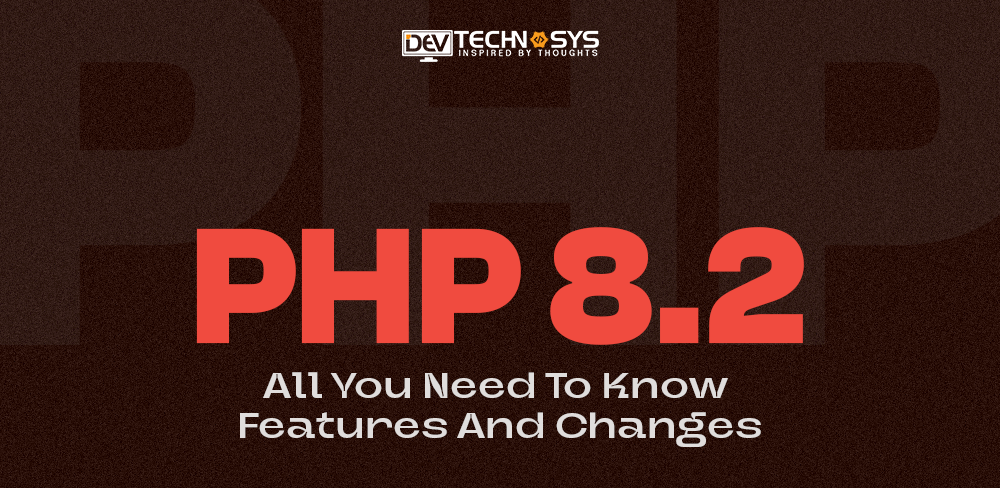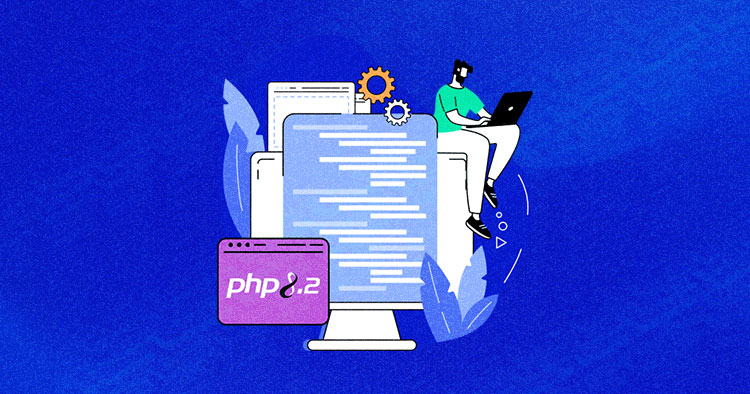PHP is an open-source programming language used for server-side scripting of website apps. It was initially named the Personal Home Page. It provides large frameworks for common operations to save the time necessary for writing software. PHP swiftly gained popularity due to its user-friendly features and wide range of abilities, so over 75% of sites utilize it for control and guidance.
One of PHP’s key benefits is that it frequently obtains upgrades that repair issues and continually adds new functionality. Due to this, programmers worldwide patiently await the newest updates to strengthen and enhance their web forms. The PHP 8.2 release date was in December 2022.
Thus, in this blog, we will discuss the latest version of PHP 8.2 including all the major features and necessary changes.
What is PHP 8.2?
Version 8.2 of PHP, which was released in December 2022, improved the development process, added some new functionality, and corrected errors from earlier iterations.
The procedure also managed to get rid of earlier, less-used obsolete functionality. You must update your web app to the latest edition of PHP if it is built on an earlier version. It would surely enhance the functionality and protection of your app.
PHP 8.2 New Features
Here are the essential features of PHP 8.2. So let’s have a look at the essential features.
1. Read-only Classes
Read-only classes introduced in PHP 8.2 go beyond read-only attributes. A class’s variables are effectively made read-only when that class is made read-only. Additionally, it assures that all variables are defined and stops dynamic behavior from being added to read-only classes. The readonly User class dynamically declares each of its attributes to be read-only.
2. Disjunctive Normal Font Types
The DNF method, which involves placing disjunctions between connectives, is used to structure Boolean formulas. In this, we may combine the Unions and Collision types using the type description that was written in the DNF.
The parser can read it. In PHP 8.2, the fonts can become more effective by the novel DNF types functionality in PHP 8.2. The variable description, return type, and input statement is all included in this DNF.
3. Redact Sensitive Parameters in Back Traces
In every codebase, reporting production faults to the services is standard procedure. Programmers would be notified if something problem occurs. Additionally, it entails transmitting stack data to the third-party service across the network.
It includes names, variables, and some confidential material like a password. You are allowed to annotate these vulnerable arguments in PHP 8.2. When any problem occurs, it stops the stack traces from displaying the error.
4. Constants in Trait
Constants can now be declared in attributes thanks to PHP 8.2. The traits cannot be easily reached, but if a class uses a trait, those constants become class constants. PHP 8.1 and before did not permit this. It is impossible to retrieve trait constants immediately. Additionally, the trait constants should not contradict any additional traits or the local class in which they are used.
5. New mysqli_execute_query Function and mysqli::execute_query Method
A simpler method for managing customized MySQLi queries is introduced in PHP 8.2. You can create, bind, and research confirms in the same code using the mysqli execute query function and the mysqli–execute query procedure. When a query has been performed effectively, you will receive the mysqli result property.
6. Allow True, False, and Null as Standalone Types
Scalar types such as string, int, and bool are already present in PHP. It became extended in PHP 8.0 with the introduction of type systems. It permits variables to be of various sorts. False and null were not permitted as standalone types, whereas the same RFC permitted their use as union types. If you specify false, null, or a freestanding type, the result will be a critical error.
7. Allow Dynamic Properties Attribute
With the introduction of the new #AllowDynamicProperties property in PHP 8.2, it is now possible to use deformations without receiving a deprecation warning. It is a universal domain declaration that accepts no parameters. Taking help from an experienced PHP development company to improve your PHP to the latest version would be a better choice.
Deprecated Features PHP 8.2
Here are some of the deprecated features of PHP 8.2 that you must check.
- #utf8_encode() and utf8_decode() Functions
- Mbstring: Base64, Uuencode, QPrint, and HTML Entity Encodings
- Partially-Supported Callables
- ${var} String Interpolation
Some Major Changes in PHP 8.2
- Random extension improvement
- MySQLi no longer supports libmysql
- Sort order changes for the ksort functions
- The str_split Function Returns Empty Arrays for Empty Strings
Takeaway
Like any other well-liked web framework, PHP may cause some problems for users while creating applications. However, it is frequently updated with the latest PHP 8.2 version.
This version streamlines the app’s development cycle while introducing additional capabilities to enhance the application’s usefulness and protection. Therefore, if you lack programming knowledge or expertise, you must seek the assistance of professional Programmers to improve your PHP to the latest edition.



















